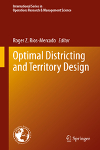- About MAA
- Membership
- MAA Publications
- Periodicals
- Blogs
- MAA Book Series
- MAA Press (an imprint of the AMS)
- MAA Notes
- MAA Reviews
- Mathematical Communication
- Information for Libraries
- Author Resources
- Advertise with MAA
- Meetings
- Competitions
- Programs
- Communities
- MAA Sections
- SIGMAA
- MAA Connect
- Students
- MAA Awards
- Awards Booklets
- Writing Awards
- Teaching Awards
- Service Awards
- Research Awards
- Lecture Awards
- Putnam Competition Individual and Team Winners
- D. E. Shaw Group AMC 8 Awards & Certificates
- Maryam Mirzakhani AMC 10 A Awards & Certificates
- Two Sigma AMC 10 B Awards & Certificates
- Jane Street AMC 12 A Awards & Certificates
- Akamai AMC 12 B Awards & Certificates
- High School Teachers
- News
You are here
Optimal Districting and Territory Design

Publisher:
Springer
Publication Date:
2020
Number of Pages:
223
Format:
Hardcover
Price:
139.99
ISBN:
978-3-030-34311-8
Category:
Collection
[Reviewed by , on ]
Dennis Gordon
09/27/2020
It’s amazing – such seemingly disparate areas of human activity as creating fair voting districts, police and other emergency services, electrical power, school districts, and assigning sales territories among many other problems appear to often have solutions with much in common. Yet, there is no specific “optimum district problem.” In general, the mathematical problem of districting is to create districts – subdivisions of a parcel of land as an example - that are contiguous, compact (roughly round in shape), balanced (containing equal populations or other desirable and often demographic variables). These problems are especially important in the creation of voting districts so necessary in modern democracies. Computational geometry is used in creating these political districts, especially in avoiding districts that favor one political party and known as gerrymandering. Here is something to think about next time you vote.
Overall, the book is arranged in three parts and a total of ten chapters each of which is written by different authors according to their respective expertise. Part I is simply Introduction and Literature Review, with Part II as Theory, Models, and Algorithms. With the final Part III we have Applications and Case Studies. In addition, there are numerous illustrations in the form of diagrams, graphs, tables of data, and maps; some are even in color.
In addition, numerous references are included - both printed and on the internet – at the end of each chapter and also an index (and I still find it irritating to buy a book that does not have one.) And, finally, like many specialized works this one too is available from different sources at varying prices, so be sure to shop carefully.
In spite of having studied chemistry (Wayne State University and The University of Kansas) and enjoying a professional career in both academic and industrial research, Dennis’ greatest personal interest in science is mathematics. Now retired, he is a voracious reader, and with his wife Sally, they enjoy traveling in their sports car, bluegrass music, and the wonders of Wisconsin. Dennis may be contacted at denniswmgordon@cs.com
See the publisher's website.
- Log in to post comments




